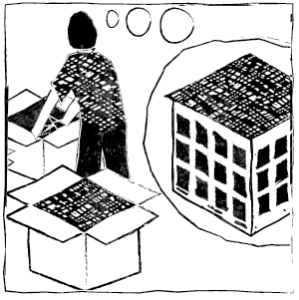STEM community college student and contributor Elinore Alms on the first day of college for autistic students.
College is an exciting time and for autistic students everywhere, but it can be rife with barriers before you even make it to the first day of classes. However, with the help of family, friends, and mentors, many youths secure funds and move through the application process successfully. When the first day comes, it can bring a variety of emotions and complications. The good news is, there are ways to soften the impact of this radically new experience. I have personally used many of these strategies and wished I had used others – they are good tips for anyone who is anxious about beginning new classes.
The Month Before

Every college has a disability services center. It’s important to make an appointment with disability services at least a month before school starts so you can tour and get in touch with other resources. This would be a good time to learn the procedure for getting accommodations you may need, such as assistive technology. For example, every office at my college has a text device available, but one can only access it through an official accommodation.
Getting used to the school is essential for a successful first day. Most colleges and universities have standard orientation days, but the setting can be overwhelming. There are usually accommodations for disabilities, but it will also be helpful to visit multiple times and find classes.
A close friend or family member will have an idea of your needs. Try to bring someone whom you can talk to and have a good time with while exploring your new campus!
There are map boards around college campuses, but I find that having a printed map makes it easier to use the stars marking a position on a big board. Your campus most likely has a map online, but if you can’t print, the disability office and several other offices around campus can provide a copy.
Mark your class locations on your map, and then take a stroll around to visit each building. Campuses often have several gardens, statues, sculptures, murals, and other art on display. If this is something that interests you, take time to enjoy it while few people are about!
Touring campus is important, but I found transportation to be the absolute worst part. I biked until my bike was stolen, then I bussed for two years and I have never felt so antsy in my life. Never knowing if the bus would show up early or not at all, I thought there could be nothing worse. Though driving saves so much time, experiencing city highways and inner streets always seems like a gamble. When I began school, transportation was at the forefront of my mind as a barrier. Thankfully, there are some steps you can take to ease this part of the experience.
Most counties have disability services for adults, including transportation to school and other locations. This may be one of the most valuable tools you can use, so be sure to ask about it and follow through. If you need help filling out the application or gathering necessary information, disability services can often help with that, too.
Are you going to school from home, or straight from work? You should probably make a trip around at least once from each location. I discovered that there was a ton of construction being done all through my route, and I had to adjust it unexpectedly. This is easier done when you’re not in a race to find parking.
Buses are somewhat unpredictable, but if you have to use them and you know they can be late, be sure to catch an earlier bus. Participation is a few percentage points in most classes, which can make the difference between grades. Be sure to bring something entertaining. I hooked up a gaming controller to my phone and played old-school video games. Buses are often free or discounted for students.
Cars are fast, but parking lot gridlock does not discriminate. With campuses increasing their student population every year, it’s becoming impossible to meet the demand for parking spaces. My own college is experiencing this issue and I have parked a block or more away before. There are usually spots closer than that, especially if you have a disability placard, but either way, it’s good to check out the neighboring areas and note the places you’re allowed to park (and if they have time limits).
The Week Before

Read all the information you can find! Your teachers will open any online portals the day before or the day class begins, so you need to make sure you have your student email and portals set up. I was once blindsided by a weekly lab because those hours were cut off on the computer screen, so I had to figure out how to free up an extra 4 hours per week. It’s a great idea to check over the course description in the catalogue, where you can find times, dates, descriptions, and sometimes the needed supplies.
The First Day (And the First Week)
If you don’t know where to go, this is a great opportunity to ask your supportive friend for help. Alternatively, you can go into any administrative office and ask the person at the desk for guidance to disability services or other locations. Disability services will be equipped to give you a calm area to take a break in or help with a difficult task.
Show up early… just in case. You never know which days and times are going to be busiest, and parking a car is a challenge. I’ve already mentioned how it’s important for your grade to be on time, but it’s not just about your GPA: instructors are good people to know when you’re looking for a job, mentorship, and inspiration. College professors are intelligent and specialized; they’re often friendly and willing to discuss their topic at length. If you want to get to know your professor, start it off on the right foot.
If you do show up late, quietly enter and tune in to the lecture or activity as quickly as possible!
After class, it’s nice to make a positive first impression and say hello to your instructor.
Ask a question or make a comment about the lecture or the subject of the class. Many nights last semester, I ended up spending the second half of labs chatting with my teacher after I completed the task. By the end of the class, I was quite sad to go.
Plan ahead. When classes are over for the day, spend some time relaxing to avoid the classic after-school meltdown. Temple Grandin’s famous “squeeze machine” helped her relax before and after school. Though most people don’t keep squeeze machines around, there are some pretty relaxing things you can have and do at home to relieve stress. Relaxation activities include kinetic sand (a personal favorite), indoors hammocks, weighted blankets, and of course, the good old-fashioned bath-time and a book. Whatever works for you, do it! You absolutely earned it!
I hope this list helps you get through the first week. Good luck on your new journey, and let me know in the comments if you have any questions or want to share your own tips!




